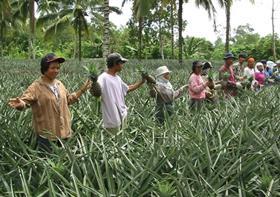
The Australian Centre for International Agricultural Research (ACIAR) will be running two programmes in the Philippines to develop profitability and competitiveness of fruit and vegetable value chains.
ACIAR is supplying the majority of the funding; about A$4m out of the total A$6.5m cost. Various Australian and Philippine collaborators will provide the rest of the capital.
The Centre’s horticulture research program manager Les Baxter told Fruitnet the programmes’ aimed to improve the profitability of fruit and vegetable crops in the Philippines.
“We want to raise the level of producers’ income,” he said. “A lot of food security is about having some cash to buy what you can’t produce, so we want to move these farmers from subsistence to actually getting an income, so they don’t have to grow everything they eat and they can send their kids to school.”
The vegetable programme is focused on making domestic crops more productive and efficient, while the fruit programme has both a domestic and export focus and aims to develop the export market for high-value commodities like mangoes.
The New South Wales and Queensland departments of primary industries are managing the vegetable and fruit programmes respectively, and several Philippine universities and businesses from both countries are also involved.
Mr Baxter said ACIAR was working closely with local producers. “ACIAR is really about capacity building and sustainable development. The way we work is we do partnered research between Australian R&D groups and with Philippine providers, so it’s a bit of a joint venture.”
“We’re actively engaging with the commercial sector, and we’re actively seeking partnerships,” he said. “For example, with papaya we’re working with Fresh Del Monte. They outsource 80 per cent of their production to small growers, so rather than contact all of them separately we can work with small growers via Del Monte.”
Transferring benefits to Australian agriculture is one of ACIARs aims with overseas projects, and in the past the Centre’s efforts have had a considerable impact in Australia. Mr Baxter says the current programme is no different.
“There’ll absolutely be benefits for Australian agriculture,” he said. “In the fruit project we’re doing a lot of work with the Department of Primary Industries aimed at mango growers. That’s helped them a lot and we’ve spent a lot of money on them. There are also lots of problems in Australia with the papaya industry with quality and quantity, and the research we’re doing will help them too.”
One aspect the programme is focusing on is organic composting and alternatives to artificial pesticides. The research in the Philippines is driven by the low cost of practices like biofumigation for small-scale farmers, but the technology is looked upon keenly by Australian producers looking for green ways to replace chemicals like methyl bromide.



